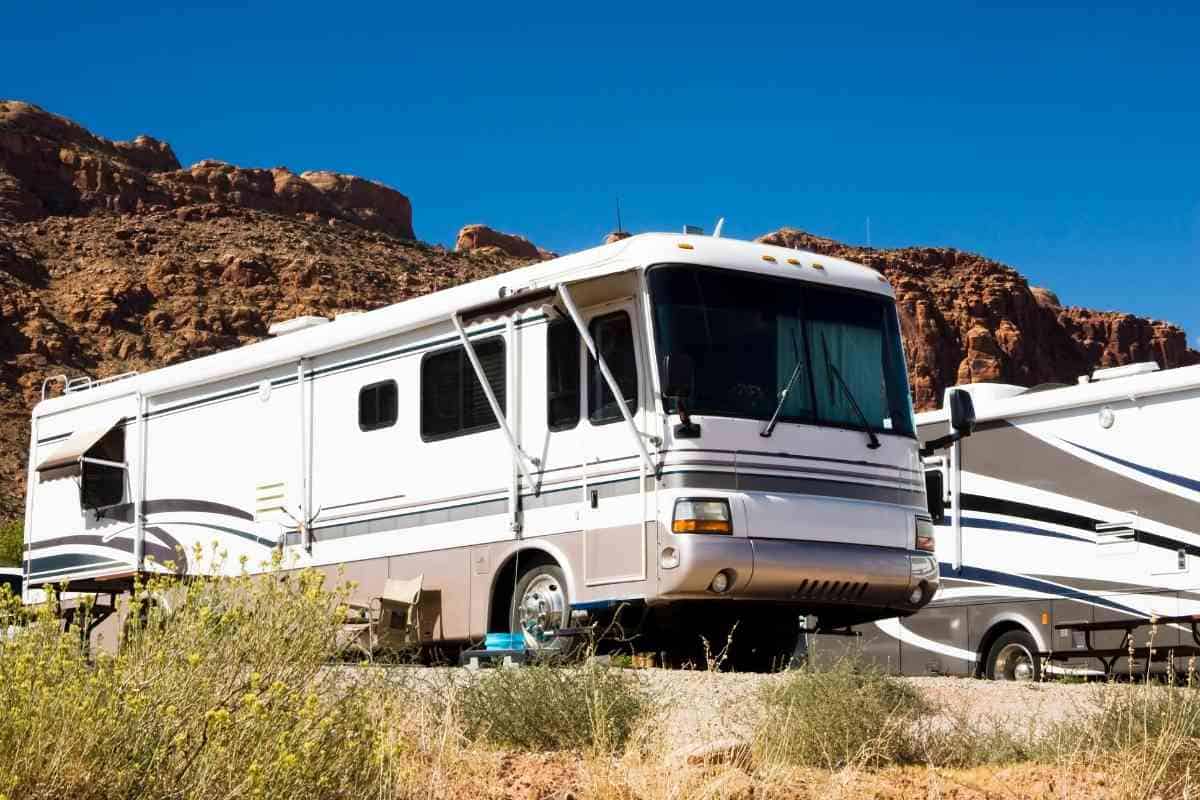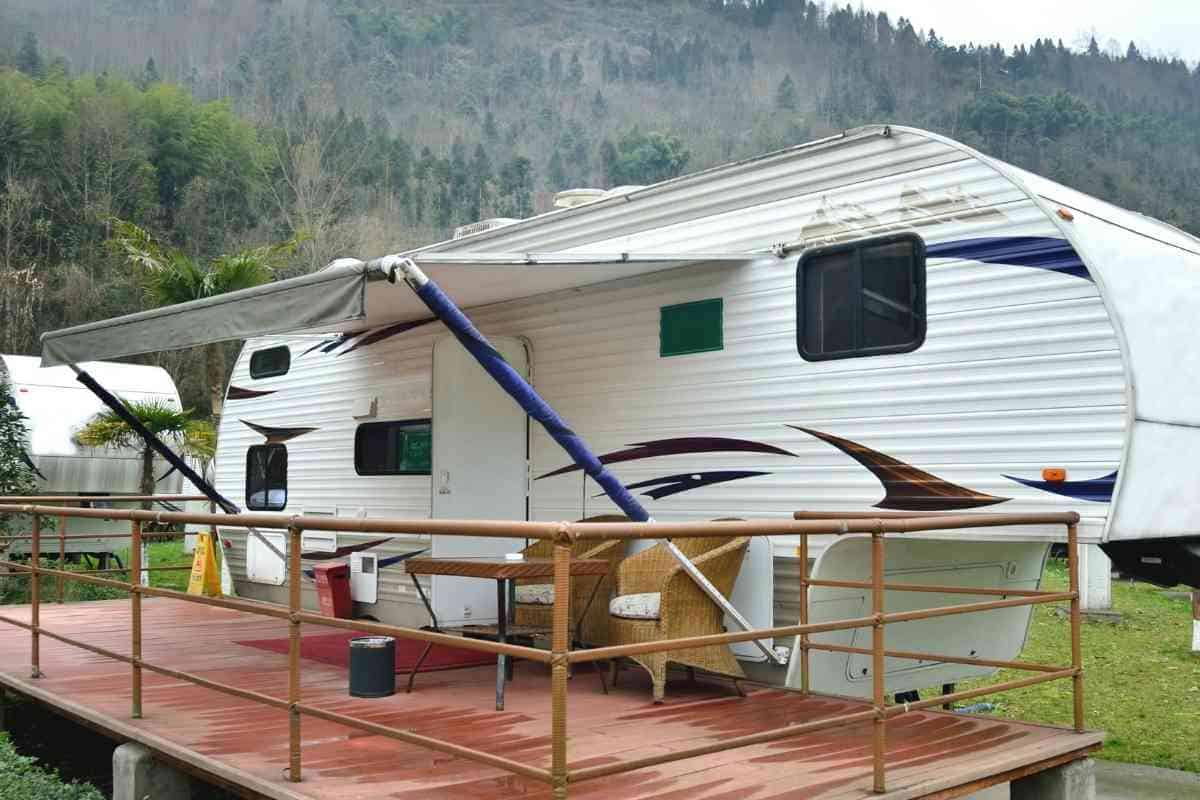Why Does My RV Battery Smell Like Rotten Eggs? 4 Reasons Explained
Waking up in the morning on a nice summer day only to smell rotten eggs throughout the RV can put a damper on the day. But why does your RV smell like that? The battery in an RV is a vital part of the vehicle. It is responsible for many functions, and when it starts to produce a rotten egg smell, this concerns many drivers because, without a functioning battery, you can’t use the RV.

Why does my RV battery smell like rotten eggs?
RV batteries will smell like rotten eggs when they are overcharged because this causes overheating. The extreme heat causes the acid to burn, causing a rotten egg odor to emit from the battery. This smell indicates that hydrogen sulfide is emitting from the battery too.
If the RV battery smells like rotten eggs, some potential causes should be known before taking action. It also indicates the battery’s sulfuric acid is reacting with the lead plates to form hydrogen sulfide. This is an easily detectable odor you can smell when you open the RV’s hood.
In-depth research about the construction of RV batteries and the impact of sulfur ensures all information below is accurate. Keep reading to become an expert on RV batteries and learn how to identify the funny smells they produce.
Why Does My RV Battery Smell Like Rotten Eggs?
RVs are complex vehicles and have many technical issues, including battery problems. One issue many RV owners face is a rotten egg smell coming from the battery.
This is a common problem with RV batteries, and various factors can cause it. Three potential causes include an overcharged battery, a corroded battery, or a poorly ventilated battery.
These are different causes, but they all result in a sulfuric acid leak which is the primary culprit for that rotten egg odor. When sulfuric acid leaks, it breaks down into hydrogen sulfide to cause a potent rotten egg smell.
Battery Is Overcharged
Most often, the rotten egg smell is a result of an overcharged battery. An overcharged battery has too much voltage and heat, causing sulfuric acid to break down and produce hydrogen sulfide.
Hydrogen sulfide is what gives the rotten egg smell. To properly charge a battery, it’s best to determine how many amps it pulls.
You will then want to determine what charger you want to use. Once you know these two factors, you can plug the numbers into the charger to charge your battery.
If the battery is overcharged, it should either be taken off the charger or manually charged. We recommend contacting an RV service center if you need help charging your battery.
Is A Battery Bad If It Smells Like Rotten Eggs?
If a battery smells like rotten eggs, it likely means the battery is bad. But this is not always the case; it depends on the condition and usage.
To confirm whether the battery is bad or not, it should be taken to a professional shop with expertise in analyzing individual batteries. This will help determine whether it can still be used or if a replacement is required.
Why Do Batteries Smell Like Rotten Eggs?

Sulfuric acid is naturally produced in batteries; however, it can also corrode the battery’s terminals and cause a sulfuric acid leak. When this happens, the sulfuric acid breaks down into hydrogen sulfide. This is what causes the rotten egg smell.
We have established that overcharging is the cause, but what causes overcharging? There are a few reasons this happens worth considering.
Defective Charger
The battery smells like rotten eggs because the battery has been overcharged. This is because when the RV is plugged in or charging, it sends too much power to the battery, which causes it to overcharge.
When the charger used for the battery is defective, this happens often. Because it’s faulty, it cannot send the correct amount of power, and the current that passes through the battery exceeds the required amount.
This increases the heat and gases released in the battery, resulting in a rotten egg odor. The only way to resolve this issue is by replacing the charger.
Oversized Charger
An oversized charger for an RV battery can do the same type of damage as a detective one. When the battery is too big, the current it passes through the battery is too powerful to convert.
This results in increased battery heat and gases, causing the amps also to increase. As the current gets hotter, the sulfur in the battery overheats, and the battery becomes overcharged.
This leads to a rotten egg smell. The only way to avoid this is by replacing the charger with one 10% lower in amps.
Equalization Mode Charger
If misused, RV battery chargers also have an equalization mode setting that can be detrimental to the sulfur content. It will increase the voltage on purpose in a controlled manner.
This is considered a controlled overcharge, but doing it too often will eventually overheat the battery too much. This will cause the rotten egg smell to occur.
The best way to avoid this issue is by switching to a new charger without equalization mode. The only other solution is to use the batter in a better-ventilated area or monitor the settings closer.
Bad Battery Cell
Bad battery cells in your RV battery can cause it to overcharge and overheat, leading to a rotten egg smell. This can be avoided by checking the battery cell voltage every month.
This happens when the lead plates short out, and the heat rises excessively. As the heat increases, more gases are released and sulfur converts, causing the smell.
The battery can be tested and checked, and each cell can also be tested individually. If any cell fails, the battery should be replaced.
What Does It Mean When Your Battery Stinks?
When a battery stinks, it means overcharging happens because the smell comes from sulfur. A battery can emit a strong smell of sulfur, which is usually associated with rotten eggs.
Sulfur, in particular, is a byproduct of the chemical reaction that powers most batteries. This chemical reaction, called sulfation, occurs when lead sulfate crystals form in the battery’s electrolyte fluid.
It also means that, in most cases, the lead-acid battery can no longer provide enough power to start your RV. But getting the battery inspected by a professional is the better option before disposing of it.
The positive and negative plates break down as the battery starts to stink. As this happens, they can no longer store the chemical energy properly, causing the smell.
After these plates break down, the charger current cannot charge the battery safely, so the current increases the temperature of the battery. This leads to overcharging, and when the sulfuric heats up too much, it converts into hydrogen sulfide.
When hydrogen sulfide is released from the battery, it creates a rotten egg smell.
Why Does The Inside Of My Camper Smell Like Rotten Eggs?
If the inside of the camper smells like rotten eggs, then it is likely that your battery is causing the smell. Batteries produce hydrogen sulfide when they break down. This is what causes that rotten egg smell.
The smell is often more pungent inside the camper because it is confined with no ventilation. However, there are other reasons besides an overcharged battery for why you smell rotten eggs in the camper.
Propane Leak
The rotten egg smell is a common symptom of a propane leak. When the gas leaks out, it has an odor that smells like eggs despite propane having no odor.
Gas companies manipulate this odorless gas as a precaution to allow users to identify a leak. They use mercaptan to give propane a distinct rotten egg smell, so anytime there is some type of leak, people are aware.
This chemical has similar properties as sulfur but is much less effective and dangerous. It only acts as a scent for propane and natural gas.
Holding Water Tanks
If the RV also has a holding water tank or a water heater tank, this is a common reason why the inside of a camper will smell like rotten eggs. This happens for two reasons.
First, the water heater can build anaerobic bacteria and react with the magnesium or aluminum anode rod included in the design. This causes a reaction and results in a release of trace amounts of hydrogen sulfide.
As discussed, hydrogen sulfide is a primary culprit for any rotten egg smells around an RV. The same can happen in the fresh water holding tanks.
To resolve the issue, empty and sanitize the tanks to remove the smell. They can also benefit from a complete system flush.
Sewage Problems
Another reason why the RV can smell like rotten eggs is due to sewage problems. As expected, sewage never smells good, so this is likely the least surprising cause mentioned thus far.
However, when the smell reaches the motorhome’s interior, there is a bigger problem. And the issue relates to the dump valves.
When the dump valves are left open, the tanks will release all types of odors into the RV. And one of the common smells is the rotten egg odor.
Close these tank valves and seal up any areas with sewage. Removing the smell will require some candles and disinfections, but once the valves are closed, it won’t be long before it subsides.




![Do Yurts Have Running Water? [6 Steps To Success!]](https://freedomresidence.com/wp-content/uploads/2022/05/Do-Yurts-Have-Running-Water-768x512.jpg)

![Can You Live In A Yurt Year-Round? [4 Things To Consider!]](https://freedomresidence.com/wp-content/uploads/2022/05/Can-You-Live-in-a-Yurt-Year-Round-1-768x512.jpg)